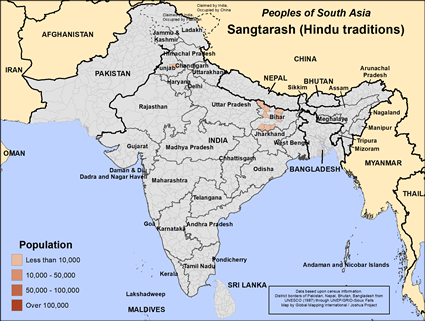The Hindi-speaking Hindu Sangtarash people live in Bihar, India. Historically, they have been stoneworkers and artisans, specializing in carving and shaping stone for construction and sculptures. The Sangtarash community has passed down its skills over generations, contributing to local architecture and infrastructure projects. Although modern changes have brought shifts in economic opportunities, many Sangtarash families continue to work in their traditional occupation while others have branched into other forms of manual labor.
Most Sangtarash families work in stone carving or construction, using their traditional skills to create sculptures, building materials and monuments. In addition to stonework, some families engage in agricultural activities or small trade to support themselves. Their work is labor-intensive, often involving entire families, with men typically handling the stone carving and women managing household duties or assisting in manual tasks.
Villages where the Sangtarash live consist of extended family networks, with homes made from brick, mud and stone. Life revolves around work, family and religious activities. Younger generations increasingly seek education and employment outside of traditional stonework, pursuing opportunities in nearby towns and cities while maintaining ties to their communities.
The Sangtarash people practice Hinduism, observing major festivals such as Diwali, Holi and Makar Sankranti. They worship deities like Vishnu, Shiva and Durga and also honor local gods associated with the land and their craft. Religious rituals are often held at local temples and shrines, where families gather to offer prayers for success in their work and the well-being of their families.
Religious practices are deeply integrated into their daily lives, with prayers and rituals often connected to their work. Temples serve as important spiritual and social centers in Sangtarash communities, where families participate in religious ceremonies and community events.
The Sangtarash people face challenges related to economic development, education and healthcare. Traditional stonework often provides limited financial stability, especially as modern materials and construction methods replace demand for their craftsmanship. Access to vocational training, modern tools and alternative employment opportunities would help Sangtarash families improve their economic security.
Education remains a significant need in their communities, with many children lacking access to quality schooling. Expanding educational resources and infrastructure would allow younger generations to explore new career paths and increase their prospects for upward mobility.
Healthcare services are often inadequate, with families traveling long distances to access medical care. Improving healthcare infrastructure and making services more accessible would greatly benefit the Sangtarash community and enhance their overall quality of life.
Pray for their educational and medical needs to be met.
Pray for the lives and culture of the Sangtarash people to evidence the rule and reign of the Kingdom of God as they open to the gospel, and for the beauty of Jesus to be seen in them.
Pray for a "Book of Acts" type of movement to Christ among the Sangtarash community in Bihar.
Pray for the Sangtarash people to understand and embrace that Jesus wants to bless their families and neighborhoods.
Pray for Holy Spirit anointed believers from the Sangtarash people to change their society from within.
Pray for a movement in which the Holy Spirit leads and empowers disciples to make more disciples.
Scripture Prayers for the Sangtarash (Hindu traditions) in India.
Ethnologue: Languages of the World
Reports from Indian NGOs on rural labor communities in Bihar
Academic research on traditional stonework and artisan communities in India
| Profile Source: Joshua Project |











